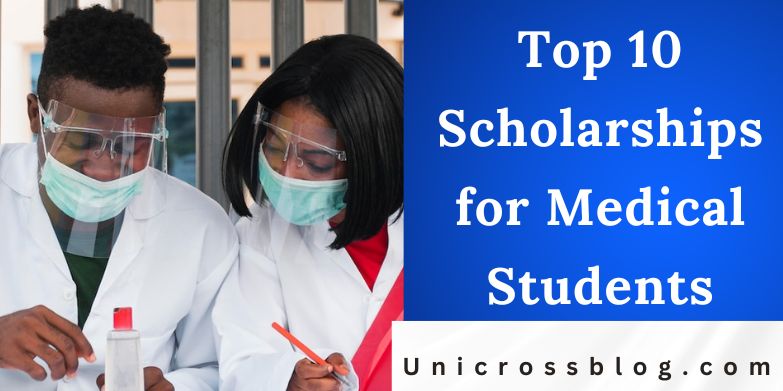Pursuing a medical education is a commendable but financially daunting journey. With medical school tuition often exceeding $50,000 annually and average student debt surpassing $200,000, scholarships are vital for easing the financial strain.
These awards not only reduce reliance on loans but also allow students to focus on rigorous coursework, clinical rotations, and preparing for residency without the constant worry of financial burdens. In 2025, a wide range of scholarships are available to medical students, catering to diverse backgrounds, academic achievements, financial needs, and commitments to underserved communities.

Top 10 Scholarships for Medical Students
1. National Health Service Corps (NHSC) Scholarship Program
Award Amount: Covers full tuition, required fees, books, supplies, and a monthly living stipend (approximately $1,500).
Eligibility: Open to U.S. citizens or nationals enrolled in accredited medical (MD or DO), dental, nurse practitioner, nurse midwife, or physician assistant programs. Recipients must commit to serving in Health Professional Shortage Areas (HPSAs) for at least two years after completing training.
Application Process: Submit an online application through the Health Resources and Services Administration (HRSA) portal. Required documents include academic transcripts, two letters of recommendation, a personal statement detailing your commitment to primary care, and proof of enrollment. Applicants undergo a competitive review process, with preference given to those demonstrating a strong commitment to underserved communities.
Deadline: April 25, 2025
Key Strategy: Craft a compelling personal statement that highlights personal experiences, such as volunteering in underserved areas or overcoming socioeconomic challenges, to align with NHSC’s mission of improving healthcare access. Attend informational webinars hosted by HRSA to understand the program’s expectations.
2. Tylenol Future Care Scholarship
Award Amount: 10 awards of $10,000 and 25 awards of $5,000 annually.
Eligibility: Available to U.S. residents pursuing graduate degrees in medicine, nursing, or pharmacy with at least one year of study remaining. Applicants must demonstrate academic excellence and leadership in community service or healthcare-related activities.
Application Process: Complete an online application, including academic transcripts, GPA, a detailed record of community involvement, and a 500-word essay on your career goals in healthcare. Two letters of recommendation are required, ideally from professors or healthcare professionals.
Deadline: August 1, 2025
Key Strategy: Focus your essay on specific patient care experiences or community health initiatives, such as organizing free health screenings, to showcase leadership and empathy. Ensure recommendation letters highlight your academic and professional potential.
3. American Medical Association (AMA) Physicians of Tomorrow Awards
Award Amount: $10,000 (multiple awards across categories like diversity, under-represented groups, and regional recipients).
Eligibility: U.S. citizens, permanent residents, or DACA recipients in their final year of medical school. Candidates must be nominated by their medical school dean and demonstrate academic excellence, financial need, and leadership in medicine.
Application Process: After nomination, submit a financial statement, a 500-word personal statement on your contributions to medicine, official transcripts, and two recommendation letters (one from the dean).
Deadline: January 31, 2025 (varies by category).
Key Strategy: Build strong relationships with faculty and deans early in your medical school journey to secure a compelling nomination. Tailor your personal statement to reflect your unique contributions, such as research or advocacy for healthcare policy changes.
4. Herbert W. Nickens Medical Student Scholarships
Award Amount: $5,000 (five awards annually).
Eligibility: Third-year medical students who are U.S. citizens, permanent residents, or DACA recipients. Applicants must demonstrate leadership in addressing educational, societal, or healthcare inequities for racial and ethnic minorities.
Application Process: Requires nomination by the medical school, a 1,000-word personal statement outlining efforts to eliminate inequities, a dean’s nomination letter, a faculty recommendation letter, a CV, and transcripts.
Deadline: April 4, 2025
Key Strategy: Use your personal statement to narrate specific initiatives, such as mentoring underrepresented students or advocating for equitable healthcare access, to demonstrate impact. Ensure your CV is polished and highlights relevant leadership roles.
5. Dolores Zohrab Liebmann Fund
Award Amount: Full tuition plus an $18,000 annual living stipend for up to three years.
Eligibility: U.S. citizens enrolled at designated institutions (check with your school’s financial aid office) with demonstrated financial need and strong academic records. Open to graduate students in various fields, including medicine.
Application Process: Obtain application forms through your school’s financial aid office. Submit via the dean’s office with academic transcripts, a personal statement, a CV, and two recommendation letters.
Deadline: January 15, 2025
Key Strategy: Write a versatile personal statement linking your medical education to long-term career goals, such as advancing medical research or public health. This can be repurposed for other scholarship applications to save time.
6. UnitedHealth Foundation/NMF Diverse Medical Scholars Program
Award Amount: $7,000 (renewable for up to two years).
Eligibility: Second- to fourth-year medical students from underrepresented groups (African American, Hispanic/Latino, Native American, or specific Asian/Pacific Islander subgroups). Applicants must commit to a 200-hour community health project serving underserved populations.
Application Process: Submit an online application through National Medical Fellowships, including transcripts, a personal statement, a project proposal, and two recommendation letters.
Deadline: March 15, 2025
Key Strategy: Develop a detailed, feasible community health project proposal, such as a health education workshop for low-income communities, to demonstrate your commitment. Document all relevant volunteer work to strengthen your application.
7. BoardVitals Medical School Scholarship
Award Amount: $2,000 (first place), $1,000 (second place), $500 (third place).
Eligibility: U.S. residents enrolled in accredited MD, DO, or residency programs. Applicants must submit a creative video response to a prompt about medical education reform.
Application Process: Create a 1-2 minute video addressing the annual prompt (e.g., solutions to the physician shortage). Submit via the BoardVitals website with basic academic information.
Deadline: April 30, 2025
Key Strategy: Produce a concise, high-quality video with a clear narrative. Use data or personal anecdotes to propose innovative solutions, such as expanding telemedicine training in medical curricula.
8. White Coat Investor Scholarship
Award Amount: Varies (approximately $10,000 per winner, multiple awards).
Eligibility: Full-time professional students in medicine, osteopathy, dentistry, or related fields with good academic standing. Open to U.S. residents.
Application Process: Submit a PDF with contact information, academic details, and an 800-1,200 word essay on any topic relevant to your professional journey.
Deadline: August 31, 2025
Key Strategy: Choose a unique essay topic, such as overcoming personal challenges in medical school or financial literacy for future physicians, to stand out. Edit your essay meticulously for clarity and impact.
9. American Medical Women’s Association (AMWA) Scholarships
Award Amount: $500–$1,000 (multiple awards, including the Linda Brodsky MD and Anne C. Carter MD awards).
Eligibility: Women medical students who are AMWA members, with awards based on financial need, academic merit, or alignment with AMWA’s mission to advance women in medicine.
Application Process: Submit an online application with a 500-word essay, a financial need statement, transcripts, and one recommendation letter from a mentor or professor.
Deadline: December 15, 2025 (varies by award).
Key Strategy: Join AMWA early to network and access exclusive scholarship opportunities. Highlight leadership roles, such as organizing women’s health initiatives, in your essay.
10 Bloomberg Philanthropies’ Scholarship for Black Medical Students
Award Amount: Varies (often covers significant tuition costs).
Eligibility: Students enrolled at Howard University College of Medicine, Meharry Medical College, Morehouse School of Medicine, or Charles R. Drew University of Medicine & Science. Open to Black medical students demonstrating financial need and academic potential.
Application Process: Contact your institution’s financial aid office for specific application instructions, which typically include transcripts, a personal statement, and financial documentation.
Deadline: Varies by institution (typically February–March 2025).
Key Strategy: Engage with your school’s financial aid office early to understand specific requirements. Highlight your commitment to addressing health disparities in Black communities in your application.
READ ALSO: How to Write a Winning College Scholarship Essay: 10 Expert Tips
FAQs
Are there scholarships specifically for underrepresented groups in medicine?
Yes, several scholarships target underrepresented groups. The UnitedHealth Foundation/NMF Diverse Medical Scholars Program supports African American, Hispanic/Latino, Native American, and certain Asian/Pacific Islander students. Bloomberg Philanthropies’ Scholarship focuses on Black medical students at specific institutions. Other organizations, like the National Medical Fellowships, offer additional opportunities for underrepresented minorities. Check eligibility carefully, as some require specific community service commitments.
Do medical school scholarships require repayment?
Most scholarships listed here are grants that do not require repayment, unlike loans. However, service-based scholarships, like the NHSC Scholarship Program, require a post-graduation commitment to work in underserved areas (e.g., two years for NHSC). Failure to fulfill this obligation may result in financial penalties. Always review terms carefully before accepting.
Can international students apply for these scholarships?
Most of these scholarships require U.S. citizenship, permanent residency, or DACA status due to funding restrictions. However, some programs, like the UnitedHealth Foundation/NMF scholarship, may consider international students from specific underrepresented backgrounds. International students should also explore institutional scholarships through their medical school or local medical societies, which may have fewer restrictions.







